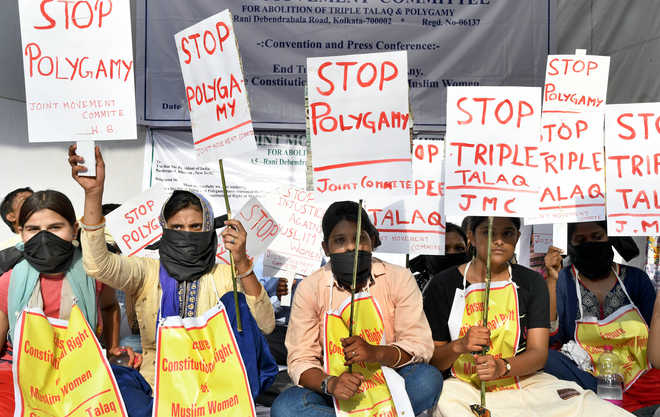Soon after the Lok Sabha passed The Muslim Women Bill, the activists and advocates associated with it raised the issue of polygamy. A victim of Triple Talaq, Rizwana responded to the bill by saying that the bill alone wouldn’t end the exploitation of Muslim women in marital ties.
Instead, she believed that men would take undue advantage of the law and indulge in polygamy openly as it is still in practice. “The abolition of triple talaq can alone not help us“, said 33-year-old Rizwana, a victim of polygamy. Whether we call it an infringement of personal laws or otherwise, one needs to acknowledge that the practice of polygamy is resulting in inflicting injustice on many Muslim women. Its defence always surfaces through religious precepts.
I met Firdousa last December. She must have been around 35. She was introduced to our Kashmir Women’s Collective team through a gender sensitization workshop. On our first meeting, Firdousa had a scar just below her eye. She had been married for eight years now.
It had been a love marriage, against the wishes of both families. The two lived happily till her first child was born. In the coming year, she observed changes in his behaviour. They had regular fights but never something she considered serious. Firdousa was expecting her second child when a nine-month pregnant woman came knocking on her door, telling her that she was her husband’s second wife. To her shock, her husband confessed, without any signs of remorse.
Within the male circles, religious acceptance of polygamy is often used as a joke.
He presented references from the Quraan about polygamy, leaving Firdousa speechless. She told me that she did not object because her objection would go against religious teachings. In the coming days, Firdousa, her husband, his second wife and a baby and Firdousa’s two kids had to live in one room due to limited resources available to them.
Years passed and Firdousa had to endure abuse – physical as well as psychological. As the kids kept growing, so did their expenses but their father was nowhere close to undertaking all those. Firdousa had enough when he hurled a firepot over her and beat her. She had never given consent to her husband’s second marriage but opposing it seemed sinful. More importantly, her husband never asked her for it.
In her attempt to get justice, she discussed the abuse with others in the family and then with the elders in the locality. All of them had one clear answer – he did it because religion permitted it. No questions asked.
Firdousa failed to get any support from those she trusted only because they had interpreted religion in a way that suited the larger structure of patriarchy. The Quraan has made it clear that a man can marry more than once only if he can do justice to all his wives. Doing justice included her consent and that she is taken care of.
Also Read: Female Sexuality And Islam – A Think Piece
No such ‘privileges’ are extended to women. In Kashmir, polygamy was a common practice many years ago and it was acceptable to many considering religious sanctions. It disappeared eventually and now in a world very different from then, the practice is getting reborn.
One cannot ascertain how common polygamy exactly is, but those who enter into polygamous or bigamous marriages do it because they are unable to fulfil their sexual desires in one marriage. In such cases, polygamous marriages often start with an extramarital affair and with a person getting cheated on, it is highly unlikely to treat all partners equally.
The stories of cheating husbands and second marriages are discussed only in quiet corners in offices and parks. Many are still afraid to expose their husbands fearing a backlash. Within the male circles, on the other hand, religious acceptance of polygamy is often used as a joke. Men, married or otherwise, use it to flirt or cheat – Muje toh char allowed haina (I am allowed 4 women)!
Firdousa had nowhere to go if she left her husband’s house. At her parental home, the conditions were never suitable for her return and she did not earn enough to manage on her own. She knew she would be branded a ‘bad woman’ if she took any step against her husband.
Despite the assumptions about second marriage, Islam does not allow lies and deceit.
But something hit her deeply when her husband hurled a firepot at her. She put the issue before the elders in her locality who disappointed her. The decisions, when the locality is brought into the picture, is usually taken by men alone, for such committees comprise men.
It was only after listening to these men dodging Firdousa’s complaints that she decided to lodge a complaint in the police station. It was a huge step for her but she went ahead with it. On the other hand, there are countless others, who may not have any financial security, who remain silent sufferers, because they feel a religious pressure to not speak out.
Islam does allow four marriages to a man but does not encourage the same. It apparently allowed polygamy considering the surplus female population and there are countless reasons put forth by different scholars which mostly fail in application in our societies. Supposing the surplus female population was an issue in Saudi Arabia during the Prophet’s era – the skewed gender ratio is a reality now.
Does that not change the marriage setup? Moreover, women today are more self-reliant and do not require marital alliances to live a decent life. Despite the assumptions about second marriage, Islam does not allow lies and deceit. The people justifying it today fail to realize the context and use Islamic sanction for legitimizing a man’s right to cheat on his wife.
Also Read: What Is Killing Kashmiri Women And Why Aren’t We Talking About It?
Featured Image Credit: Tribune India
About the author(s)
A teacher and a learner.




